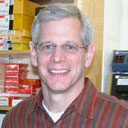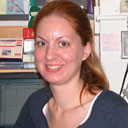
For Release: February 25, 2008
Contact: DMS Communications 603-650-1492
Cancer Cells May Tolerate Odd Chromosome Shuffles, DMS Researchers Find

Dr. Duane Compton

Sarah Thompson
HANOVER, NH—Many cancer cells have the wrong number of chromosomes—too many or too few—but they seem to have adapted a quirk that allows them to keep growing in spite of the deviations, Dartmouth Medical School biochemists report.
These new findings offer clues to understanding and treating solid tumors, where chromosome mismatches are common. The study appears in the Feb 25 Journal of Cell Biology by Dr. Duane Compton, a professor of biochemistry, and Sarah Thompson, a graduate student.
Healthy human cells store their genetic information in 46 chromosomes or 23 pairs; solid tumor cells have anywhere from 40 to 70, sometimes up to 90 chromosomes, according to Compton, a member of the Norris Cotton Cancer Center. This phenomenon of strange numbers is termed aneuploidy.
When a cell divides, its chromosomes line up, then split perfectly into two duplicate strands that go to each daughter cell. In tumor cells, the chromosomes align, but frequently go astray: one daughter gains extra chromosomes and the other loses some, a process described as instability. This chromosome instability occurs, as far as scientists know, randomly in terms of which or how many chromosomes wander, but at high rates.
Watching human breast, colon and lung cancer cells divide, the researchers determined how the chromosomes shuffled. Equally intriguing, they discovered that the tumor cells, unlike normal cells, seem to tolerate the chromosome discrepancies and continue to propagate.
In ordinary situations, daughters with unusual chromosome quantities generally drop out of the colony so the overall population of cells retain their right count, and preserve normal functions. But the imbalanced tumor cells kept regenerating, the researchers found.
"Tumor cells pick up some adaptation that allows them to grow happily when they have improper numbers of chromosomes. We think this adaptation is a key to tumors and could give insight to target only abnormal cells," Compton said.
Tumor cells pick up some adaptation that allows them to grow happily when they have improper num- bers of chromosomes.
—Dr. Duane Compton
The researchers observed a problem during tumor cell division in the way the chromosomes attached to filaments that segregate them to daughter cells. Then to home in on the molecular mechanisms, they recapitulated the instability in otherwise normal cells, using tricks to induce chromosomes to latch inappropriately to the fibers.
"By reproducing the instability we think it can help us identify how to potentially reverse the instability," Compton said. "Moreover, through our experiments, we understand how chromosome instability is insufficient to ultimately cause tumor aneuploidy at these crazy numbers. Something makes the cell tolerant to abnormal chromosome counts. Figuring out such an adaptation might offer a strategy to turn off the pathway and target only aneuploid cells."
Conventional chemotherapy blocks all dividing cells, which is why patients lose hair, have immune suppression and other side effects. Singling out the abnormal tumors cells without killing all dividing cells could alleviate many such problems.
For more information, contact Compton at duane.compton@dartmouth.edu.
-DMS-